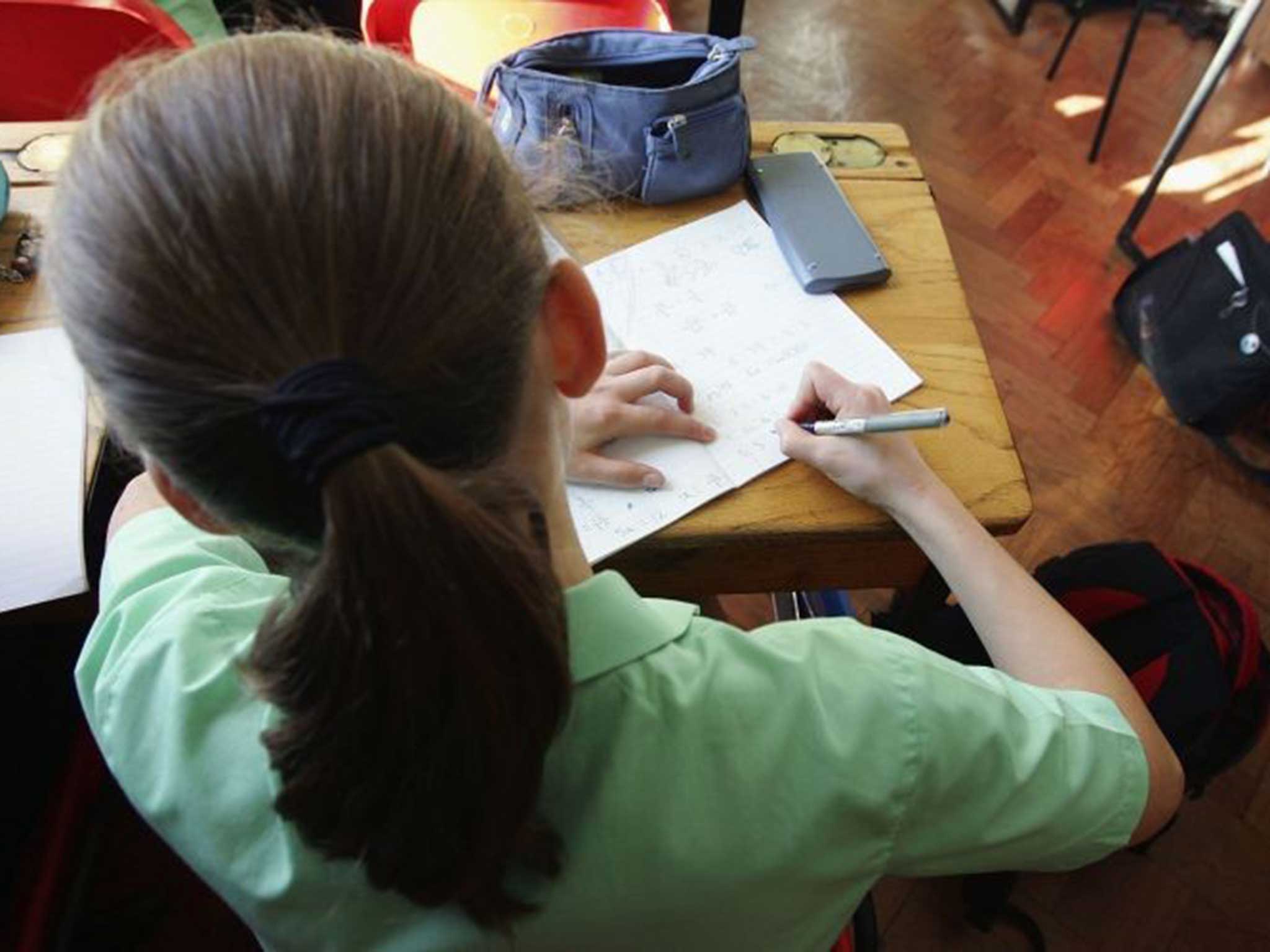GCSE shake-up means fewer subjects for pupils to take
Government attempts to make exams harder will be wrongfooted by schools starting core subject courses a year early

A revolutionary shake-up of the secondary school timetable will mean pupils spend three years, instead of the current two, studying for GCSEs in crucial subjects such as maths and English .
Many schools are expected to begin GCSE studies when pupils are 13, in response to government education reforms that have made exams harder.
The switch is most likely to be made in maths, where the new GCSE will require more in-depth knowledge of the subject, particularly in algebra and geometry. The new exam, to be set for the first time in the summer of 2017, is considered so demanding that an existing additional maths exam has been scrapped because its topics will be covered in the new GCSE.
Changes are also likely in the maximum number of GCSEs teenagers will take – reducing from 12 to eight – as new exam performance tables will rank schools on their performance in only eight key subject areas. These include the English Baccalaureate subjects of English, maths, science, a language and a humanities subject.
In the past, league tables have concentrated on the percentage of pupils getting five A* to C grade passes, including maths and English, prompting concerns that teachers focus on borderline C grade candidates rather than stretching brighter pupils to obtain A* or A grades.
Speaking to The Independent on Sunday, Paul Dodd, director of education and learning at the Oxford, Cambridge and Royal Society of Arts (OCR) exam board, said: "Maths will be a very challenging GCSE. From our point of view as an awarding body, it is very important to make teachers aware of the fact it will be challenging."
Teachers will be able to choose between two papers for their pupils: higher maths, which offers pupils a pass at grades 4 to 9, and a less testing paper, which offers only grades 1 to 5. The numbered structure will replace the present A*-to-G system with a nine-grade scale in which a pass of 9 resembles "a sort of A**", said Mr Dodd.
Experts suggest that pupils will have to spend an extra hour a week on maths in the classroom, although Mr Dodd said the increase would simply bring the UK into line with the class time spent on the subject in other countries.
"The content of the maths GCSE is so big that I have heard schools say they will teach it over a three-year period from this September," he added. "In effect, Key Stage Four will become a three-year course. A lot of schools have already decided that," Mr Dodd said.
"I think it is quite likely a lot of the new GCSEs will fit into this pattern, particularly English and maths. Hopefully the specifications will be accredited [by exams regulator Ofqual] by September."
Many schools have acknowledged they are biding their time by devoting three years of secondary schooling to pre-GCSE study.
On the subject of pupils taking fewer GCSE exams, Mr Dodd added: "The whole accountability system is changing and they will focus on GCSEs in eight subject areas.
"Candidates won't be doing 12 GCSE's, as some have done in the past, because the whole accountability system will drive candidates to do fewer subjects."
The dramatic shake-up comes at a time when exam boards and Ofqual are warning there will be greater "volatility" in this year's A-level GCSE exam results.
Key influences will be the move towards end-of-year exams and away from coursework, which will favour those pupils who shine in test environments.
A drop of around 300,000 (40 per cent) in the number of pupils put in for GCSE exams early to "bank" C-grade passes, crucial to a school's league table position, could actually boost exam results as borderline C-grade students will have longer to study before their exams. The drop follows the former education secretary Michael Gove's ruling that only a student's first sitting will count towards league tables.
In changes to GCSE English, a speaking-and-listening test will no longer count towards the exam grade, in a change that is expected to penalise some schools.
Of post-GCSE education Mr Dodd said the AS-level exam was likely to be "in some difficulty". Up until now, the exam has counted towards A-level grades, but Mr Gove insisted on decoupling it, so that it sits as a standalone qualification. Many schools have dropped it as a result, making it harder for universities to discern evidence of a pupil's sixth-form work before making a provisional offer.
Meanwhile, experts are predicting at least one in four papers taken this year will be awarded an A* or A-grade pass when A-level results are published on Thursday.
In addition, while boys are likely to outperform girls at A* level, as a result of their far higher representation among the number of candidates taking maths (where a higher percentage of A* grades is recorded), there is still likely to be a substantial gender gap in favour of girls in the overall pass rates.
Girls, though, have little opportunity to improve on their performance in the subject, because their overall pass rate is close to 100 per cent.
Subscribe to Independent Premium to bookmark this article
Want to bookmark your favourite articles and stories to read or reference later? Start your Independent Premium subscription today.

Join our commenting forum
Join thought-provoking conversations, follow other Independent readers and see their replies